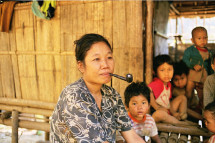Burma's Longest War: Anatomy of the Karen Conflict
Topics
Regions
As Burma enters a period of political transition, the role of the Karen ethnic communities will be critical in responding to the political and economic challenges that will shape their future. An in-depth history and analysis of the Karen's complex relationship with the Burmese state and central government.

Authors
Political grievances among Karen and other ethnic nationality communities, which have driven over half a century of armed conflict in Burma/Myanmar, remain unresolved. As the country enters a period of transition following the November 2010 elections and formation of a new government, the Karen political landscape is undergoing its most significant changes in a generation. There is a pressing need for Karen social and political actors to demonstrate their relevance to the new political and economic agendas in Burma, and in particular to articulate positions regarding the major economic and infrastructure development projects to be implemented in the coming years.
The country's best-known insurgent organisation, the Karen National Union (KNU), is in crisis, having lost control of its once extensive 'liberated zones’, and lacks a political agenda relevant to all Karen communities. Meanwhile the government's demand that ceasefire groups, such as the Democratic Karen Buddhist Army, transform into Border Guard Forces under direct Burma Army control throws into question the future of various armed groups that have split from the KNU since the 1990s. In this context, Thailand-Burma border areas have seen an upsurge in fighting since late 2010. Nevertheless, the long-term prospect is one of the decline of insurgency as a viable political or military strategy.
Equitable solutions to Burma's social, political and economic problems must involve settling long-standing conflicts between ethnic communities and the state. While Aung San Suu Kyi, the popular leader of the country's democracy movement, seems to recognise this fact, the military government, which holds most real power in the country, has sought to suppress and assimilate minority communities. It is yet to be seen whether Karen and other ethnic nationality representatives elected in November 2010 will be able to find the political space within which to exercise some influence on local or national politics. In the meantime, civil society networks operating within and between Karen and other ethnic nationality communities represent vehicles for positive, incremental change, at least at local levels.
This joint TNI-BCN project aims to stimulate strategic thinking on addressing ethnic conflict in Burma and to give a voice to ethnic nationality groups who have until now been ignored and isolated in the international debate on the country. In order to respond to the challenges of 2010 and the future, TNI and BCN believe it is crucial to formulate practical and concrete policy options and define concrete benchmarks on progress that national and international actors can support. The project will aim to achieve greater support for a different Burma policy, which is pragmatic, engaged and grounded in reality.
The Transnational Institute (TNI) was founded in 1974 as an independent, international research and policy advocacy institute, with strong connections to transnational social movements and associated intellectuals concerned to steer the world in a democratic, equitable, environmentally sustainable and peaceful direction. Its point of departure is a belief that solutions to global problems require global cooperation.
Burma Center Netherlands (BCN) was founded in 1993. It works towards democratisation and respect for human rights in Burma. BCN does this through information dissemination, lobby and campaign work, and the strengthening of Burmese civil society organisations. In recent years the focus has shifted away from campaigning for economic isolation towards advocacy in support of civil society and a solution to the ethnic crises in Burma.
Pages: 56